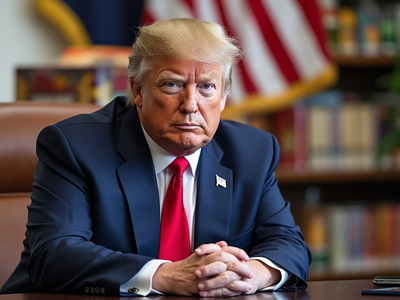UAE's Strategic Emergence in Global Alliances
The United States' diplomatic outreach underscores the UAE's evolving role as a pivotal partner in international relations.
The recent visit by the President of the United States marks a significant moment in diplomatic relations, as it highlights the United Arab Emirates (UAE) as a key strategic partner rather than merely a friendly state.
This visit is not simply a diplomatic courtesy; it signifies the UAE's transformation into a crucial player in shaping new global partnerships and a redefined approach to international relations.
During his time in the UAE, the U.S. President engaged in discussions that led to agreements exceeding $200 billion in trade and investment.
These deals include the establishment of an artificial intelligence hub that aims to serve half of the world's population, reflecting both nations' interest in advancing digital transformation.
This initiative aligns with the UAE's national strategy for artificial intelligence, which includes the creation of a dedicated ministry focusing on this sector.
The political landscape reveals a shift in U.S. engagement in the Gulf region.
Previous administrations exhibited hesitance in their Middle Eastern strategies and attempted to scale back U.S. presence.
In contrast, the current administration prioritizes strengthening ties with Gulf states, recognizing the strategic vision and awareness of their populations.
This approach fosters a convergence of national interests between the U.S. and UAE, with a focus on intelligent alliances.
The perception of the UAE has evolved within U.S. foreign policy frameworks, transitioning from a mere partner in regional security to a reliable collaborator in building the digital infrastructure of the future.
The emphasis on digital capabilities, cybersecurity, and innovation showcases the changing dynamics of power, where control increasingly resides not only in military assets but also in data management and technological infrastructure.
This visit has established a framework for what may be referred to as the "third generation" of U.S.-UAE relations, where collaboration extends beyond oil into the realms of economic expertise and defense.
The relationship is now characterized as a partnership dedicated to shaping the future.
The UAE's leadership and infrastructure provide a robust basis for its emerging role as a balancing force in the region and the evolving global order.
This development is indicative of a greater shift, in which the UAE is not merely a passive participant but an active contributor to the international landscape, underlining its significance in both U.S. strategies and global equations.
The implications of the U.S. President's visit to the UAE are profound, as it signals a new phase in the management of international relations and the importance of the UAE in future negotiations.
The underlying messages convey that those who possess vision and credibility can emerge as vital partners in shaping global alliances.
This visit is not simply a diplomatic courtesy; it signifies the UAE's transformation into a crucial player in shaping new global partnerships and a redefined approach to international relations.
During his time in the UAE, the U.S. President engaged in discussions that led to agreements exceeding $200 billion in trade and investment.
These deals include the establishment of an artificial intelligence hub that aims to serve half of the world's population, reflecting both nations' interest in advancing digital transformation.
This initiative aligns with the UAE's national strategy for artificial intelligence, which includes the creation of a dedicated ministry focusing on this sector.
The political landscape reveals a shift in U.S. engagement in the Gulf region.
Previous administrations exhibited hesitance in their Middle Eastern strategies and attempted to scale back U.S. presence.
In contrast, the current administration prioritizes strengthening ties with Gulf states, recognizing the strategic vision and awareness of their populations.
This approach fosters a convergence of national interests between the U.S. and UAE, with a focus on intelligent alliances.
The perception of the UAE has evolved within U.S. foreign policy frameworks, transitioning from a mere partner in regional security to a reliable collaborator in building the digital infrastructure of the future.
The emphasis on digital capabilities, cybersecurity, and innovation showcases the changing dynamics of power, where control increasingly resides not only in military assets but also in data management and technological infrastructure.
This visit has established a framework for what may be referred to as the "third generation" of U.S.-UAE relations, where collaboration extends beyond oil into the realms of economic expertise and defense.
The relationship is now characterized as a partnership dedicated to shaping the future.
The UAE's leadership and infrastructure provide a robust basis for its emerging role as a balancing force in the region and the evolving global order.
This development is indicative of a greater shift, in which the UAE is not merely a passive participant but an active contributor to the international landscape, underlining its significance in both U.S. strategies and global equations.
The implications of the U.S. President's visit to the UAE are profound, as it signals a new phase in the management of international relations and the importance of the UAE in future negotiations.
The underlying messages convey that those who possess vision and credibility can emerge as vital partners in shaping global alliances.











